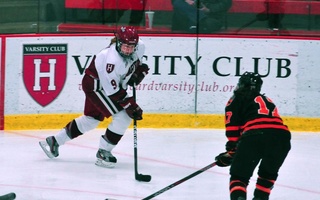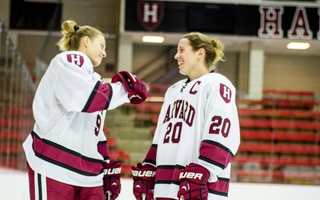
Co-captain Jillian Dempsey is one of a handful of Harvard women's hockey players with experience on the international stage.
Junior forward Lyndsey Fry and sophomore defender Michelle Picard are used to taking the ice for Harvard women’s hockey coach Katey Stone in the Crimson’s red and white uniforms. But next month, the duo will be adding a third color to their jerseys when Stone sends them on the ice: blue.
Fry and Picard will travel to Vantaa, Finland, to represent the United States in the Four Nations Cup, a tournament that will pit the Americans against the Finnish, Canadian, and Swedish national teams. Stone serves as the squad’s head coach and led the team to a silver medal in last year’s competition.
“The way [Stone] coaches is consistent,” says co-captain Jillian Dempsey, who has represented the U.S. under Stone. “What she does here [at Harvard shows] the same values she brings to the U.S. program, too. It’s the same mindset…. She expects just as much from us here as she does [with the U.S. team].”
Fry agreed with her Harvard captain, saying that she has not seen a difference in Stone’s interactions with the athletes she sees year-round in Bright Hockey Center.
“It’s not like she treats us as her Harvard kids,” the forward says. “She treat us like her ‘U.S.A. kids.’”
Stone has been involved with the U.S. national team since 1996, including roles in the U.S. National Development Camps and the U-18 team, where she won the inaugural IIHF U-18 World Championship.
In 2010, Stone was named the head coach of the senior national team and continued her strong record, leading the squad to the program’s fourth IIHF World Championship in 2011.
Stone believes the connection to the national team has been a boon for Harvard’s program, giving her most talented players a chance to learn in a much different environment.
“I’m very fortunate that I coach some very smart players [at Harvard],” Stone says. “And then they go to the next level where there is an abundance of ability. They’re the ones who always had the puck on their stick, so they might not have the same vision that you need. That’s the beauty of it–helping them see the game in different ways, off the puck as much as on.”
Fry and Picard have previous experience playing for their country. Both players joined college teammates senior Josephine Pucci and junior Marissa Gedman—both of whom are out this season with injury—and Dempsey as the American U-22 Select Team swept Canada in a three-game series this past August.
Playing with postgraduate players on the full senior team for the first time, Fry says she is excited to compete in Finland next month.
“This will be the first real show for me,” she says. “I’m really interested to see the role that I will be playing on that team. Obviously, you want to give it everything you have, but I want to make sure that I do everything they ask of me, stay positive the whole time, and contribute in any way I can.”
In the series against Canada, Stone’s team faced off against two other Harvard players, sophomore defender Sarah Edney and freshman goaltender Emerance Maschmeyer.
Regardless of the nation they represent, Stone supports the players that sit on her bench in Cambridge.
“[Edney and Maschmeyer] know that we want them to do the very best, and we hope that we can do everything possible so they can fare as well as they possibly can when they go to those events,” Stone says.
FAfter seeing her new coach and teammates from the opposing bench, Maschmeyer looks forward to playing for the same team.
“Playing against some of the girls on the team and Coach Stone…got me excited to come to school, knowing I was going to play for her,” she says.
Dempsey and Maschmeyer both believe their international experiences have improved their collegiate game.
“[The international game] is obviously a much different level ,” Dempsey says. “I play wing here and will play wing here this year, so I get to practice playing wing at a higher level when I’m with the U.S. team, and here I feel more confident.”
Stone believes that her players who compete internationally motivate the rest of the team to match their performances.
“Our program has always been about helping to develop [players] to be their best and to get to the next level,” Stone says. “And to have kids that have been in the [national] programs, be it U.S. or Canada, they’re perfect examples. They’re [there] every day; they’re ratcheting up the intensity and competitiveness of practice. You just can’t duplicate that.”
—Staff writer Peter G. Cornick can be reached at pcornick@college.harvard.edu.
Read more in Sports
Decorated, But Not Done

















